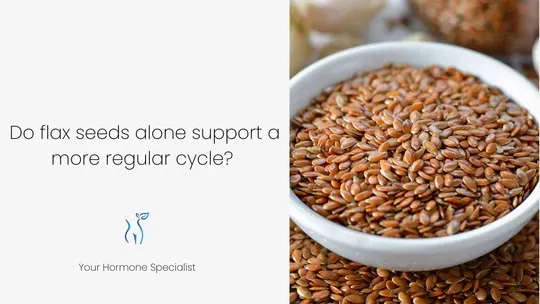
Can flaxseed affect your menstrual cycle?

Does flaxseed support ovulation?
The role of flax in seed cycling
There’s a lot of talk about seed cycling to support regular cycles and healthy ovulation. But, honestly, who has time to remember to take 1 tsp of flaxseed plus 1 tsp of pumpkin seeds once a day during the first half of your cycle AND remember to switch to sesame and sunflower during the second half of your cycle?
I spent about 2 cycles trying to seed cycle. And, when I got tired of trying to keep it all straight, I decided (finally) to spend a little bit of time researching whether there’s even any legs to seed cycling. During that research, I discovered something interesting.
Flax seed supplemented daily throughout the cycle supports ovulation
It’s not necessary to swap between all those seeds or even use all four of those seeds (flax, pumpkin, sesame, and sunflower) to support healthy ovulation. In fact, flax alone supports a regular cycle.
In a crossover study among 18 women who consumed their regular diet for 3 cycles followed by their regular diet supplemented with flaxseed for 3 cycles. The first and fourth cycle weren’t used in the evaluation so this left cycles 2 and 3 (before supplementation) and cycles 5 and 6 (with supplementation) for comparison.
In this study, 3 cycles (~8%) were anovulatory before flaxseed supplementation compared with no cycles after flaxseed supplementation. The luteal phase (2nd half of the cycle) was also longer in the flax supplemented cycles compared with the cycles before supplementation (an average of 1 day longer!). While this wasn’t a significant shift in luteal phase length, what was significant was that flax boosted the ratio of progesterone to estradiol during the luteal phase. We’ll talk about why this is super helpful for your health in the takeaway section.
Testosterone concentrations during mid-follicular development were also higher (but not statistically so) during the flax supplemented cycles.
What is estrogen dominance and why is it harmful to your health?
We’ll save my hangups over the phrase “estrogen dominance” for another post (generally speaking, it’s a term that’s overused and a catchall for many different conditions ranging from PCOS to well… luteal phase deficiencies).
Here, when I use the term “estrogen dominance” I’m specifically talking about progesterone to estrogen ratios during your luteal phase (2nd half of your cycle). This is a time during the cycle when progesterone dominates. It’s common to still see some estrogen during this time, but progesterone levels throughout the luteal phase should be high enough to know you’ve ovulated. When they’re not (so, when your progesterone is at pre-ovulatory levels after ovulation), it’s also common for estrogen to be higher than “normal” for you throughout your luteal phase, and this
Takeaways: Is flax good for ovulation, pregnancy, and estrogen dominance
Flax for ovulation: Flax alone supports regular ovulation in women.
Flax for pregnancy: By significantly boosting the ratio of progesterone to estrogen throughout the luteal phase (2nd half of the cycle), flax is beneficial for pregnancy. Progesterone is vitally important to maintain the uterine lining until the fertilized embryo is able to implant. Once implantation occurs, hCG levels rise and extend the life of the corpus luteum until a placenta is formed.
Many early miscarriages and implantation failures are due to low progesterone during the luteal phase of the menstrual cycle and so this study suggests that flax would be beneficial to boost progesterone levels during early pregnancy.
Flax for estrogen dominance: While I have a serious hang-up with the term estrogen dominance (mostly because it’s become so widely used and to capture so many different conditions that it’s pretty much meaningless without adding context), here’s the context I’m using it in for this post…
For this post, the term “estrogen dominance” is specifically referring to the progesterone to estrogen ratio during your luteal phase (2nd half of your cycle).
During the luteal phase of a healthy cycle, progesterone dominates.
While it’s common (and healthy) to have some estrogen during this time, your progesterone levels throughout the luteal phase should be high enough to know you’ve ovulated. In other words, progesterone levels throughout your luteal phase should be higher than during your follicular phase (1st half of the cycle), and when they’re not, then chances are pretty high that your estrogen levels are higher than normal for you throughout your luteal phase as well.
The problem with this is that these two hormones keep each other in check. When estrogen rather than progesterone is dominant during the luteal phase, you’re likely to experience:
Acne flare
Heavier bleeding during your period
Clots or darker blood during your period
Worsening of endometriosis symptoms
This isn’t a comprehensive list of things and we’ll spend more time in future posts talking about low progesterone/high estrogen state during the luteal phase and how this affects your health.
Seed cycle? Or flaxseed?
To wrap it all up, it’s not necessary to seed cycle to support your cycle! In fact, just by adding flax daily to your diet, you’re supporting a healthier cycle.
Why flax? Well, that’s a topic we’ll dive into even more in future posts.
References
W R Phipps, M C Martini, J W Lampe, J L Slavin, M S Kurzer, Effect of flax seed ingestion on the menstrual cycle, The Journal of Clinical Endocrinology & Metabolism, Volume 77, Issue 5, 1 November 1993, Pages 1215–1219, https://doi.org/10.1210/jcem.77.5.8077314

